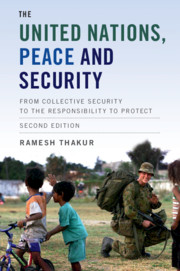Crossref Citations
This Book has been
cited by the following publications. This list is generated based on data provided by Crossref.
2017.
Books Received.
American Journal of International Law,
Vol. 111,
Issue. 2,
p.
572.
Weiss, Thomas G
2018.
The UN and Multilateralism under Siege in the “Age of Trump”.
Global Summitry,
Vol. 4,
Issue. 1,
p.
1.
White, Sabrina
2018.
Cross-Disciplinary Perspectives on Regional and Global Security.
p.
165.
He, Kai
2019.
Constructing dynamic security governance: institutional peace through multilateralism in the Asia Pacific.
Journal of Contemporary East Asia Studies,
Vol. 8,
Issue. 2,
p.
141.
Weiss, Thomas G.
and
Connelly, Nina
2019.
Protecting cultural heritage in war zones.
Third World Quarterly,
Vol. 40,
Issue. 1,
p.
1.
Kyris, George
2020.
The Palgrave Encyclopedia of Peace and Conflict Studies.
p.
1.
Petrova Georgieva, Virdzhiniya
2020.
NATO’s“Brain Death”: A Legal Perspective.
Russian Law Journal,
Vol. 8,
Issue. 3,
p.
32.
Niemann, Holger
2021.
The Palgrave Encyclopedia of Peace and Conflict Studies.
p.
1.
Mekonnen, Daniel
2021.
Nuclear Non-Proliferation in International Law - Volume VI.
p.
305.
Compaoré, W R Nadège
Martel, Stéphanie
and
Grant, J Andrew
2022.
Reflexive Pluralism in IR: Canadian Contributions to Worlding the Global South.
International Studies Perspectives,
Vol. 23,
Issue. 1,
p.
71.
Kyris, George
2022.
The Palgrave Encyclopedia of Peace and Conflict Studies.
p.
611.
Afewerky, Rahel Kessete
2022.
The Responsibility to Protect Twenty Years On.
p.
33.
Prentice, Catherine
2023.
Leveraging Emotional and Artificial Intelligence for Organisational Performance.
p.
157.
Alene, Niguse Mandefero
Ali, Mohammed Seid
and
Tadesse, Kebede Yimam
2023.
Africa's Quest for Reform of the United Nations Security Council: A Just Cause Curbed by Unrealistic Proposals.
African Journal on Conflict Resolution,
Vol. 23,
Issue. 1,
Ojakorotu, Victor
Erameh, Nicholas Idris
and
Folarin, Sheriff
2024.
Africa's Engagement with the Responsibility to Protect in the 21st Century.
p.
401.





